About yourself:
*Who are/were you?
I am Peter Abelard, once a master and canon at the University School of the Cathedral of Notre Dame. King Philip (now remembered as the First) was king of France when I was born. William of Champeaux called me the “supreme master” of dialectic after I replaced his master. My writings were denounced by the Church, and amid the scandal of a forbidden love affair, I was excommunicated and forced to burn my works in disgrace.
Who is your ‘lover’ in Hell?
Whom it has always been, hand to heart: the beautiful and learned Heloise d’Argenteuil. She was born the unimportant wife’s-daughter of a minor branch of the prestigious Garlande family, ministers to the medieval royal court of French King Philip.
She grew into one of the most learned young women of western Europe, renowned for her brilliant exegeses of philosophical and spiritual texts in Hebrew, Greek, Latin, and French. She and I conspired to make her my pupil, under the auspice of her uncle, one of my fellow canons at the Cathedral School of Notre Dame.
But calamity overtook us.
Love in hell, isn’t that a contradiction? How does this work?
There are some who say that love is something His Satanic Majesty simply cannot understand, and therefore, he cannot control it. Others, like myself, imagine He understands it all too well.
Heloise and I were illicit young lovers in turbulent times. Our tale in life ends full of wretched disappointment.
Now in Hell, we are buffeted about eternally by the gyring hurricanoes of our lively passions, and yet forever separated from one another by those same gales. Only in moments of respite can we simply be together, as we once were in life. And even then… Well. It is hell, after all, is it not? How many happy marriages are there in life, nevermind hell?
Many of the denizens of His Satanic Majesty’s realm have a curse – what is yours?
If I am to be honest before the Lord, my worst sin in life was: ‘insufferable arrogance.’ The rules of the Church and the nobles mattered not one whit to me, if they could not see what was plain before their faces in my teachings. Why should the good Lord promise the world an intellect such as mine and then litter the way to understanding with such obstinate fools?
And, if loving Heloise be a sin? I fully admit my guilt and repent the evil of it, but not one whit the joy.
Alas, there is no forgiveness for arrogants and seducers. Thus, I am tormented by raging cataracts and gales, buffeted by the winds of my passions like so many discarded broadsheets in the streets, blown at random through the netherworld.
Describe your home/environment in Hell.
I have not known a home in the millennium or more of my torment, for the winds blow where they will. Most recently, the turbulent storms of my passions for Heloise deposited my lover and I in the nightmare city of Perish, a hellish grotesque of our beloved earthly Paris. Is nothing sacred?
Eternity – that’s a damned long time. How do you spend the endless years here?
Another curse of my torment is to be broken upon the wheel—repeatedly. Wheresoever I go, I must be wary of anything with a wheel, lest it turn upon me, run me down, and mangle me.
So really, we travel a lot. And then stay a while. And then travel again. Between the ceaseless buffeting of storms and the relentless pursuit of runaway iron-shod cartwheels, I spend what time remains in discussions of love and philosophy with my beloved Heloise — smarter than myself, and by half.
The infamy of our sins kept us apart in life, but now it is delicious torment to have all of eternity in which to do as we please, rather than as we should.
Why do YOU think you’re in Hell?
Did I not mention the insufferable arrogance?
I was adulated by the crowds who gathered in the streets and worshipped by women as their knight. I grew rich on the fees paid by the aristocratic families of my students, and I was ruined for many women. I was a seducer sure of my charm but overwhelmed by work, traveling on horseback and power quarrels, when I deflowered a daughter of the powerful Garlande family, ministers to the royal court.
For these many sins — of passion and unrepentant pride, both in thought and deed — I was castrated, excommunicated, and disgraced in life. And for these many sins, I am cast down to Hell.
What is are your greatest fears/desires here?
My greatest fear is that I should be separated from my beloved Heloise. Despite all that happened between us, we maintained a correspondence of letters and advice, each to the other. Now, in Hell, we struggle to remain together against the passions that buffet us from each other. She is my only hope of someday, somehow, finding redemption in this world of loss.
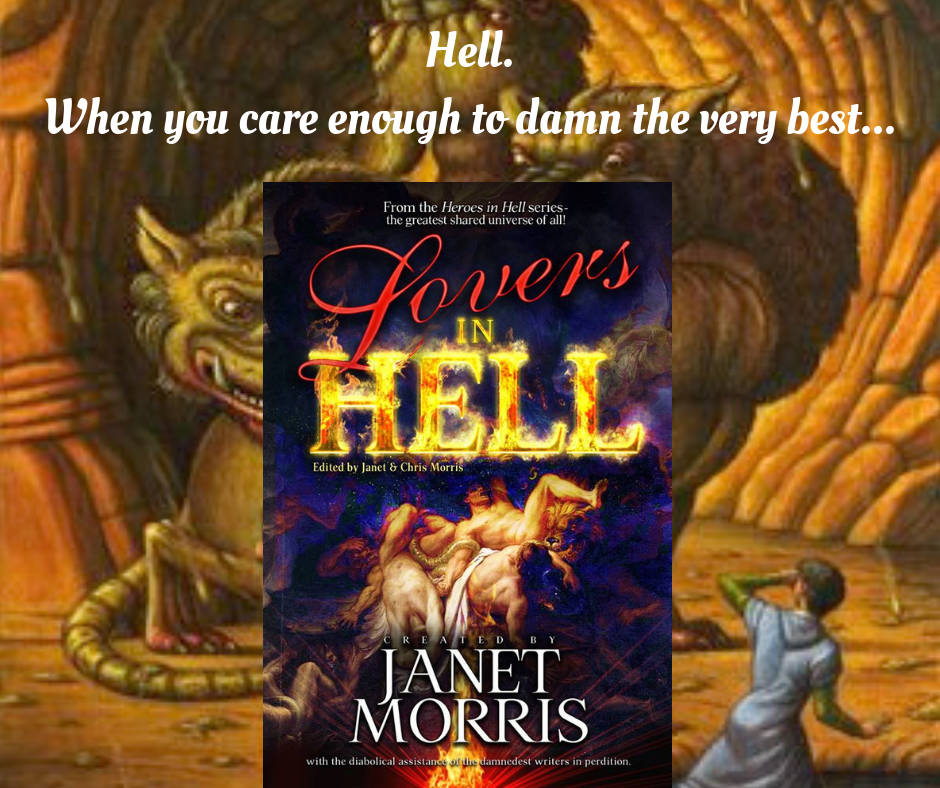
Author Spotlight
*Name and bio.
Hi, I’m Michael E. Dellert. I’m the author of The Matter of Manred Saga, an ongoing collection of fantasy tales, and the short-story “Calamity,” my contribution to the Lovers in Hell anthology. I’m a writer, editor, publisher, and writing coach. I also have two teen daughters who will be delighted to discover their good Catholic father is a Hellion. I live in the Greater New York City area.
Tell us about your story for this edition.
My story for Lovers in Hell, “Calamity,” addresses issues of love, fear, separation, pride, and humility in a fantastic Bangsian excursion into a nether-hell of torment, paranoia, and passion.
Love and romance is always a challenging topic to address. Love is (along with fear) the most universal and primal of emotions and the subject of enough literary energy to start its own fusion reaction. So what about Love in the most unlovely setting of all: Hell?
That was the question I had to ask myself when I was invited to write for Lovers in Hell. How can lovers maintain their relationship in the face of the curses that Hell can throw at them?
Several other writers in the Heroes in Hell series have depicted historically infamous sinners—Shakespeare, Napoleon, Marlowe, Caesar—with important (and sometimes successful) romantic relationships. How do they manage it? What keeps the fires burning in Hell? How would Peter Abelard and Heloise d’Argenteuil manage it? What would be their curses? What obstacles would seek to drive them apart?
What inspired you to use the character(s) you’ve chosen?
I had long been doing research on the period of the 1100s AD in Western Europe, but had never had the opportunity to do a deep dive into the Parisian academic life of Notre Dame during that period. Paris was the height of intellectual inquiry and argumentation in the Europe of the day, and the rock-star of that academic scene was Peter Abelard. He quarrelled with his colleagues, had a scandalous affair with a lady of a powerful noble family, and was excommunicated for the heresies of his Rational philosophy.
But more than all that, Peter Abelard is most well-remembered as one half of a tragic love story between himself and his student, Heloise d’Argenteuil, the tale of a lifelong respect and care for each other, despite the tragedies and plots that contrived to keep them apart in life.
And if a man is best judged by his enemies, Abelard’s were considerable, including powerful members of the monolithic medieval Catholic Church, right up to and including the Popes of his age.
Abelard was a perfect nexus for exploring a bit of the philosophy and politics of the historical Church as well as questions about love, gender equity, pride, and what it means to be ‘damned.’
How did you become involved with this project?
Near as I can figure: pure blind luck. I happened to be doing an author event on Facebook, supporting the publication of a writing colleague and promoting my Matter of Manred series.
Joe Bonadonna, whom I knew by reputation as the author of the amazing work in (among other things) Mad Shadows and Three Against the Stars, reached out to me afterward and introduced himself as an agent for Perseid Press’s Heroes in Hell Anthology Series.
I’ve been a fan of Heroes in Hell going all the way back to its first incarnation in the late 1980s. It’s been a playground for such legends in the field as CJ Cherryh and the current franchise-owner and Hellion-in-Chief, Janet Morris.
So, when Joe offered me the opportunity to submit a hellacious short story for consideration in an upcoming Heroes in Hell title, I was honoured, as well as challenged, by the thought of taking up the distinguished mantle of ‘Hellion.’ It’s a privilege to join this illustrious and infernal society in their sandbox, and I am grateful to be included in their company.
Writing for a shared world is challenging, how do you meet that challenge?
The most unique thing about the “shared world” anthology series is how it creates such a deeply contextualized milieu. The authors each bring their own specific world-views together to create this dynamic backdrop against which the actions of the characters unfold. It’s a rare sort of social contract, a mutual pact of trust between authors: that we’ll do honor to the conversation that’s gone before.
Operating within that environment requires a deep respect and admiration for the history and effort that each of those authors and editors has contributed to the series, over the course of decades.
So the first thing I did was re-read the entire anthology, from its earliest incarnation to the present, to remind myself of how lovingly this Hellish world was developed, to refresh myself with the conversations among these great and many authors, and to understand the obligations that come with writing a story set in this world. It’s a privilege, and a lot of responsibility.
Tell us why you chose this story to tell out of so many possible options?
The tragic historical romance of Peter Abelard and Heloise d’Argenteuil was a mainstay of popular literary culture in the seventeenth to nineteenth centuries, depicted with various degrees of lurid detail, but always as a tale of forbidden—but consensual—love between student and master.
The reality of their historical correspondence raises some interesting questions about consent, however. Abelard repeatedly admits that he took unfair advantage of Heloise, and perhaps even raped her. And yet there is no denying the love, care, and respect they have for each other—particularly she for him—in their later epistles.
So theirs was clearly a complex relationship, set amid a pivotal moment in European history: the rise of the university system, Rational philosophy, the early Crusades, and the consolidation of Catholic authority.
I wanted to explore what that complex relationship would look like in Hell, faced with no social inhibitions against their once-forbidden love, and only their own demons between them.
What are you currently working on?
I’m currently developing a new novel project, featuring adventure on the high seas of a savage shore, the dangers of imperialism, and the horrors of colonial subjectivism. A team of former soldiers and adventurers are dispatched in search of a mythic artefact erected by an ancient race in a lost city. Will they survive long enough to solve the mysteries and enigmas left in the ruins of empire?
I’m also tying up a fiction book proposal for another novel that’s already in the can, to be offered to publishing agents.
Name the last two books you’ve read – tell us about them.
I just finished reading Ender’s Game by Orson Scott Card, which I’m sorry to say I hadn’t already read. It’s the story of an interstellar war, and the cruelties to which man will put his fellow man in the interest of “the greater good,” told with a spartan, yet delicate and philosophical style.
I also just re-read Pirate Latitudes by Michael Crichton. A classic swashbuckling Golden Age of Piracy adventure by a modern master of adventure tales, it’s the story of a dashing English privateer and his plot to steal a galleon of Spanish gold. Set in the seventeenth century Carribean against the backdrop of the colonial pirate city of Port Royal, Jamaica. The manuscript was found complete among Crichton’s artifacts after his death, and published posthumously.
In between, I’ve been working my way through the complete Arthur Conan Doyle bibliography of Sherlock Holmes titles, and revisiting Lovecraft country.
What are your views on authors offering free books?
Authors and publishers have always offered free books to book-buyers, when that used to mean, “bookshop owners and booksellers.” On my shelf, I have a Galley Copy of an Arthurian young adult fantasy that was passed along to me by the shop-owner of a Waldenbooks, when I clerked a summer there. The Galley Copy had been sent to the owner for free by the publisher, to whet the store’s interest in stocking from their new upcoming catalog of properties.
And professional book reviewers and critics with major media outlets, professors of courses in certain subject matters, talk-show hosts, all these have received free books from authors and publishing companies. “Promotional” copies of work have always been an important part of the business model of writing and publishing.
It’s certainly part of my business model as a writer. For promotional and personal reasons, I offer a free newsletter and blog where I share creative writing tips and fresh fiction scenes from my workshop. The second “story” in my fantasy saga, The Epistles of Eithne and Eowain, is available for free from my website, and a digital copy of Hedge King in Winter is available to subscribers of my newsletter.
But at the end of the day, writing’s a job and publishing’s a job, like any other job; the ledgers have to balance. The free copies have to pay for themselves, through their promotional value. So it’s all a balancing act and every author has to tread that line as best they can.
If you could pick any quote about Hell which would be your favourite?
There was a Twilight Zone episode from the ‘80s series reboot, in which a professor argues with a devil over the plight of his soul. Throughout the episode, the devil is wearing a lettered, novelty t-shirt, but the message of the lettering changes everytime he’s in frame. My favorite message from that shirt: “Gehenna is a City. Much like Newark.” I myself grew up in that great State of New Jersey, so ever since, “Newark NJ = Gehenna.” I take a certain home-team pride in that.
What other books/short stories have you written?
So far, I’ve written and published a series of five stories — an epistle, two novellas, and two novels — in The Matter of Manred Saga, a series of heroic, low-fantasy, medieval adventures with strong Celtic themes and imagery:
- The novellas, Hedge King in Winter, and
- A Merchant’s Tale;
- Nine letters between lovers, The Epistles of Eithne and Eowain;
- And the novels, The Romance of Eowain, and
- The Wedding of Eithne.
I also offer creative writing advice and free snippets of fresh fiction on my blog and in my newsletters, The Adventures in Indie Publishing.
Your readers can learn more about my writing from my blog and newsletter.
They can also follow me on Amazon and Goodreads, on Twitter (@MDellertDotCom) and on Facebook (Michael Dellert, Author).
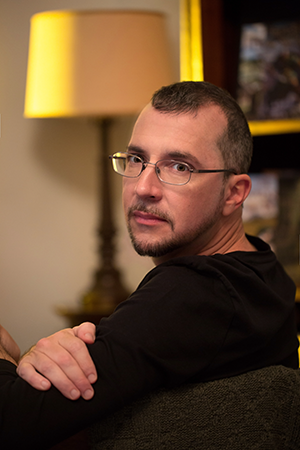
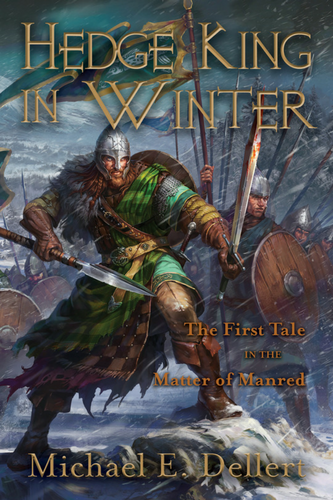

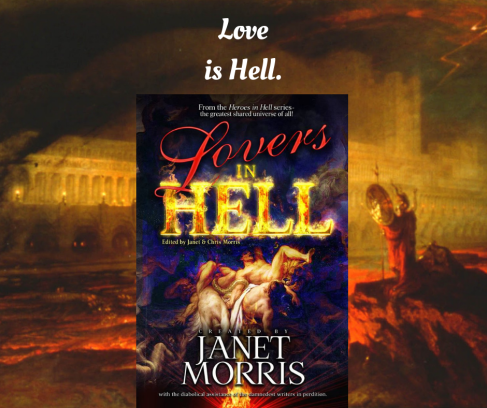



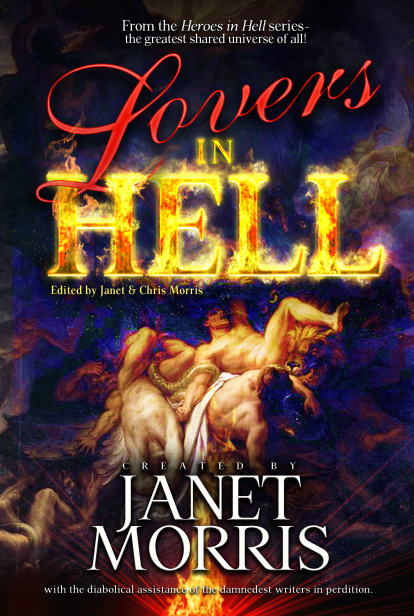




 Hopefully there should be some forthcoming interviews with authors and characters for this bundle – so keep your eyes peeled for those.
Hopefully there should be some forthcoming interviews with authors and characters for this bundle – so keep your eyes peeled for those.